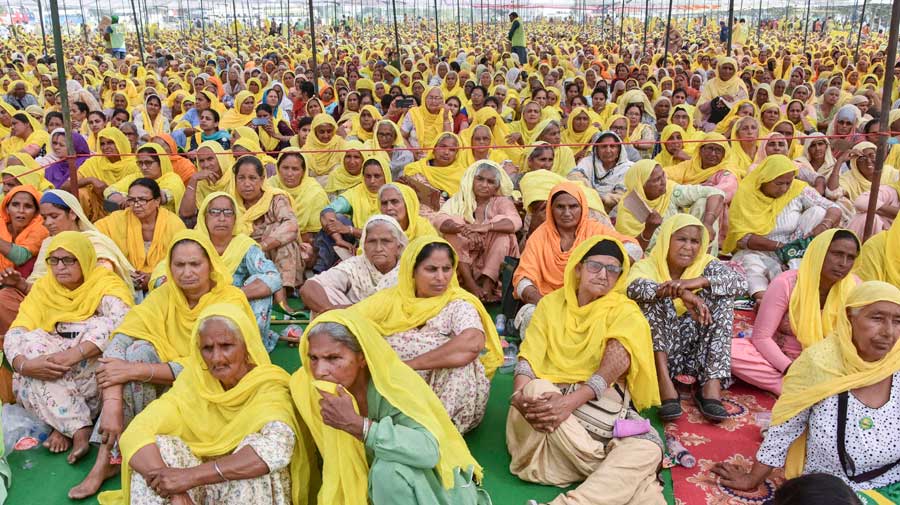A no-trust motion against the Manohar Lal Khattar government in Haryana on Wednesday provides the Congress an opportunity to confront Prime Minister Narendra Modi’s claim of good governance ahead of Assembly elections in five states at a time the BJP has been forced to remove its Uttarakhand chief minister over corruption charges.
Although the Congress, which has moved the no-confidence motion in Haryana, doesn’t expect the government to fall as Dushyant Chautala’s Jannnayak Janata Party has decided to continue to support the BJP, the Opposition hopes that the social pressure on the ruling combine’s MLAs will multiply after they defied the farmers’ pressure on them to pull down the Khattar government.
The Congress has used the no-confidence motion more as an instrument to align with the sentiments of the farmers, who want the Centre’s new farm laws repealed, than to overthrow the Haryana government.
Farmers gheraoed the houses of all MLAs from the JJP and the BJP on Tuesday, petitioning them to vote in favour of the no-trust motion.
The farmers joining the protest at Delhi’s borders are angry with Haryana chief minister Khattar who had used brute force to stop them — dug up roads and used water cannons — and tried to malign them by linking them to Khalistanis and anti-India forces. Farmers are going to election-bound states to let people know how the BJP has behaved with them.
Bharatiya Kisan Union faction chief Gurnam Singh Chaduni has described the no-confidence motion against the Khattar government as crucial and issued a video appeal saying: “Residents of the state should protest in front of the residences of legislators, who have been supporting the state government. They should warn the leaders that they would face social and political boycott if they continued to support the laws.”
In the 90-member Haryana Assembly, the BJP has 40 MLAs, the JJP 10 and the Congress 30. Seven are Independents and there are two vacancies.
While some MLAs had publicly expressed unease over the handling of the farmers’ agitation, the powerful Jats turned against the BJP, putting leaders from the community in a fix. But the no-confidence motion will determine the stance of every MLA, no matter what rhetoric they have been using to defend themselves. If some MLAs defy the party line during the no-confidence vote, the BJP will suffer embarrassment before the critical elections in five states.
The removal of Trivendra Singh Rawat as the chief minister of Uttarakhand is no less a humiliation as the decision had to be taken under compulsion a day ahead of the hearing in the Supreme Court in a case of bribery that had forced Nainital High Court to order a CBI enquiry.
The Congress grabbed the opportunity to highlight the corruption angle, with state in-charge Devendra Yadav saying: “The BJP’s Operation Cover-up cannot divert the people’s attention from four years of corruption and failures.”
Apart from dwelling on gross mismanagement during the Covid-induced lockdown and the alarming unemployment figures leading to an exodus from every village across the hill state, the Congress said: “There are so many scams, including instances of personal corruption by the chief minister. His removal is an admission of guilt by the central leadership of the BJP. But change of chief minister is not the answer, the entire government should resign and fresh elections should be ordered.”
Prime Minister Modi has been attacking chief ministers of Opposition parties on corruption and perceived poor performance and has promised to create a “Sonar Bangla”, ignoring the questionable law-and-order situation in BJP-ruled states.
The Uttarakhand case has come like a bolt from the blue at a time when the Prime Minister is flaunting his good governance plank. Rawat had been made chief minister despite indictment by a judicial commission in another corruption case.
That case, known as the Dhencha seeds scam, was about the purchase of seeds from Jharkhand and Bihar from non-existent firms when Rawat was agriculture minister in the previous BJP government. Fake truck numbers and names of firms for transportation and purchase had been furnished.
The case was similar to the fodder scam in which former Bihar chief minister Lalu Prasad is in jail, a matter the BJP never fails to highlight. The Justice Tripathi Commission had indicted Rawat and recommended the filing of an FIR.
While the Congress government, then led by Harish Rawat, did not progress on the recommendations, the BJP leadership picked Trivendra Singh Rawat as chief minister despite the indictment. Later, Trivendra Singh Rawat presided over a cabinet meeting that formally rejected the recommendations of the Justice Tripathi Commission and legitimised his continuance as chief minister.










